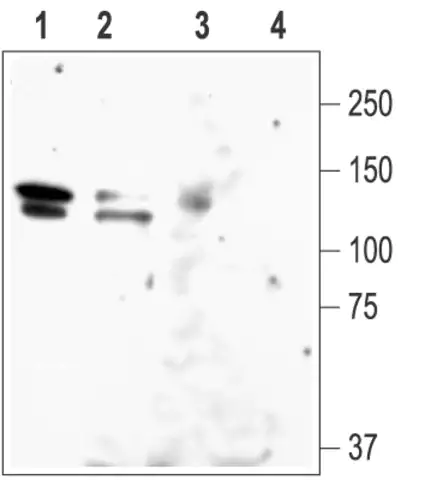您的位置:首页 > 产品中心 > Anti-Potassium Channel Kv10.1 (EAG-1) antibody produced in rabbit
Anti-Potassium Channel Kv10.1 (EAG-1) antibody produced in rabbit

| 产品编号: | 4095360 |
| 规格: | affinity isolated antibody, lyophilized powder |
| 包装规格: | 50 μL,200 μL |
| 产品类别: | 进口试剂 |
| 品牌: | Sigma-Aldrich |
| 优惠价: | 立即咨询 |
产品别名
Anti-Potassium Channel Kv10.1 (EAG-1) antibody produced in rabbit
Anti-KCNH1
Anti-Ether-a-go-go K+ channel 1
基本信息
| MDL number | MFCD08705506 |
| NACRES | NA.41 |
| General description【一般描述】 | Human genome codes for 40 voltage-gated K+ channels (KV). Voltage-gated-like ion channels (VGICs) are the third largest group of signaling molecules found in humans. K+ channels can be divided into four structural types based on their number of transmembrane regions and mode of activation, namely Kir- the inwardly rectifying 2-transmembrane K+ channels, K2P- 2-pore 4-transmembrane K+ channels, KCa- Ca2+-activated 6-transmembrane or 7-transmembrane K+ channels, and KV- voltage-gated 6-transmembrane K+ channels. KCNH1 (potassium voltage-gated channel H1) is a KV channel and is also known as KV10.1. Like all KV members, it is composed of four α-subunits with each containing six transmembrane α-helical segments, and a membrane-re-entering P-loop. These surround a central pore as homotetramers or heterotetramers. KCNH1 mRNA and protein are both abundantly found in the brain, though its peripheral tissue expression is restricted. This gene is localized to human chromosome 1q32.1. |
| Specificity【特异性】 | Specific for KV10.1 and does not cross react with KV10.2. |
| Immunogen【免疫原】 | peptide GDPAKRKGWARFKDAC corresponding to residues 802-817 of rat KV10.1. This sequence is identical in mouse and has 14/16 residues identical in human. |
| Biochem/physiol Actions【生化/生理作用】 | KCNH1 (potassium voltage-gated channel H1) initiates a slowly activating, non-inactivating K+ current in a heterologous system. In skeletal muscles, it is expressed only during the phase when myoblasts exit the cell cycle and fuse, and thus, it plays an essential role in skeletal muscle development. This protein is found to be expressed in ∼70% human cancers, including gastric, mammary tumors, colon carcinoma, and sarcomas. This channel is implicated in neuronal disorders such as Zimmermann-Laband and Temple-Baraitser syndromes. |
| Physical form【外形】 | Lyophilized from phosphate buffered saline containing 1% bovine serum albumin and 0.05% sodium azide. |
产品性质
| biological source【生物来源】 | rabbit |
| Quality Level【质量水平】 | 200 |
| conjugate【偶联物】 | unconjugated |
| antibody form【抗体形式】 | affinity isolated antibody |
| antibody product type | primary antibodies |
| clone【克隆】 | polyclonal |
| form【形式】 | lyophilized powder |
| species reactivity | rat, human, mouse |
| technique(s) | western blot: 1:200 using rat brain lysate and transfected cells HEK-KV10.1. |
| UniProt accession no.【UniProt登记号】 | O95259 |
| shipped in【运输】 | wet ice |
| storage temp.【储存温度】 | −20℃ |
| Gene Information | human ... KCNH1(3756) mouse ... Kcnh1(16510) rat ... Kcnh1(65198) |
产品说明
| Target description【目标描述】 | Potassium Channel Kv10.1 (EAG-1) encodes a member of the potassium channel, voltage-gated, subfamily H. This member is a pore-forming α-subunit of a voltage-gated non-inactivating delayed rectifier potassium channel. |
| Disclaimer【免责声明】 | Unless otherwise stated in our catalog or other company documentation accompanying the product(s), our products are intended for research use only and are not to be used for any other purpose, which includes but is not limited to, unauthorized commercial uses, in vitro diagnostic uses, ex vivo or in vivo therapeutic uses or any type of consumption or application to humans or animals. |
安全信息
| Storage Class Code【储存分类代码】 | 13 - Non Combustible Solids |
| WGK | WGK 2 |





